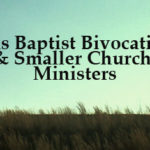Since November 2002, Don Fawcett has been the network missionary for the Heart of Texas Baptist Network in Early, Texas. From deep in the heart of one Texan, he shares his background and thoughts on church and ministry. To suggest a Baptist General Convention of Texas-affiliated leader to be featured in this column, or to apply to be featured yourself, click here.
Background
Where else have you worked, and what were your positions?
I have served as a pastor at FBC Santo in Santo, Texas, Fairview Baptist Church in Granbury, Texas, Belle Plain Baptist Church in Brownwood, Texas, and as a youth pastor at First Baptist Church Lake Brownwood in Brownwood, Texas.
Where did you grow up?
I was born and raised in Burnet, Texas. I graduated from high school there in 1980.
How did you come to faith in Christ?
I was raised in the First Baptist Church of Burnet, Texas, my hometown. I was very involved in RAs as a child and came to faith at RA camp at Highland Lakes Baptist Camp as a boy of nine years of age.
Where were you educated, and what degrees did you receive?
In high school, I was very interested in science, and so I continued my education at Texas State Technical Institute in Waco, Texas, and received a degree in Solar Energy. I then completed a Bachelor of Arts in religious education from Howard Payne University and continued studies at Southwestern Baptist Theological Seminary, where I completed a Master of Arts in theology. Finally, I graduated in 2008 from Southwestern with a Doctorate of Ministry in missions.
Ministry/Profession
Why do you feel called to your particular vocation?
For 25 years, I have been interested and engaged in mission in and through local churches. As a pastor, I led churches to mission engagement, both in their respective communities and globally. Serving in my current capacity is a natural nexus of my particular gifts and passions.
Please tell us about your association—where it’s located, the key focus of its work and ministry, etc.
The Heart of Texas Baptist Network consists of 59 churches in Brown, Mills, Comanche and San Saba counties, with one church located in Callahan County. Our office is located in Early, Texas, in the former Jones Chapel Baptist Church.
Our work includes mission engagement in Texas and globally equipping church leaders through training events, assisting churches with their needs and ministering to pastors and church staff.
What do you like best about leading your association? Why?
I receive the greatest joy out of seeing churches engage in missions. I take great joy in seeing churches become healthy, which I define as engaging in authentic relationship emerging in Spirit-led continuation of the ongoing work of Christ in the world.
Sign up for our weekly edition and get all our headlines in your inbox on Thursdays
What aspect(s) of associational ministry and/or its mission do you wish more people understood?
I think that the challenges to associations are systemic challenges stemming from global cultural change. This includes quantum changes in communication, demographics, technology, authority and its related structures and every aspect of culture.
Adaptation is critical, which requires strategic thought in most contexts. In more isolated and homogenous contexts, perhaps strategic thought is not as critical. I wish people understood and accepted quantum change for what it is because no one can stop it. They can only adapt to it.
How has your association and its mission changed since you began your career?
The changes for us are far-reaching.
First, we are not as relational on a face-to-face basis as we once were.
Second, giving and financial support from churches has steadily declined due to a variety of reasons.
Third, we are increasingly living in a post-denominational age. This doesn’t mean that denominations won’t exist, but that they don’t garner the same type of allegiance they once did. Now, there is a multitude of possible affinities and bases of cooperation in the world, all at the click of a mouse.
Our mission hasn’t really changed because it is a function of the mission of the local church, which is, in turn, a function of the universal redemptive mission of God. But our methodologies have changed dramatically.
How do you expect your association and/or its mission to change in the next 10 to 20 years?
I think that is very difficult to extrapolate due to the extreme fluidity of the current global realities. Also, our association is geographically large, and that poses special challenges that may not challenge an association consisting of a smaller area.
This association must find a way, it seems, to narrow a perceived gap between the network office and the local churches, some of which are well over a hour-and-a-half drive from this office. Likewise, some of the churches are almost 100 miles apart. This makes it very challenging to foster inter-church fellowship.
Name the three most significant challenges and/or influences facing your association.
1) Fostering and catalyzing pastoral fellowship across a large geographic area.
2) Building collective and unified vision across a large geographic area.
3) Strategically responding at this juncture to discover and implement creative pathways and adaptation in every aspect of this work.
What one aspect of your job gives you the greatest joy or fulfillment?
Global mission engagement
About Baptists
What are the key issues—opportunities and/or challenges—facing Baptist churches?
The biggest challenge facing Baptist churches includes the issues of their theological identity in regard to what it means to be kingdom citizens in relation to their earthly citizenship and the related task of rediscovering their roots and distinctives as a people called “Baptists” in today’s world. Many Baptists are now seeking to cozy up to power and empire, and, in so doing, they run the risk of forfeiture of their kingdom identity.
On the other hand, the opportunities before us are as great as they have ever been in our history. Baptists would do well to adapt as a truly global people, and, as they reflect upon their theology, they could become stronger as they listen to the voices of the church in the developing world. Globalism is here to stay, and Western provincialism must give way to a truly global conversation, which is reciprocal in nature.
What are the key issues facing Baptists as a people or denomination?
Institutions very often suffer from cultural lag. It seems we need “breakout.” We are an aging Anglo people who, in large part, have not moved toward our brothers and sisters of color, toward the poor, toward the broken, across the lines drawn by society and etched by our past sins.
We are increasingly insulated in our houses of worship, valuing fellowship and consumerism over following the example of the Good Samaritan. The hope of the Baptists or Methodists or any other denomination or spiritual entity is to put on the towel of service and move with humble intention back to those who have been passed by in the ditch — to empty our own wine on their wounds, to place them on our beasts of burden while we walk, to bring them to the inn and pay their lodging from our own purse.
No amount of theological orthodoxy can bring about spiritual renewal. The hope of revival is in engaging the immigrant, the marginalized and the broken in relational witness and friendship.
What would you change about the Baptist denomination—state, nation or local?
I do not know. It is like turning a flotilla surrounding an aircraft carrier. The leaders we have are good leaders. One cannot critique them without walking in their shoes. The concept that there is some “change” that must come to the denomination that can be easily applied is most often not applicable.
The quantum changes in our world now are akin and analogous to the invention of the printing press or the microchip. They are triggering shock waves on a global scale in every human endeavor. Sometimes nothing can be done.
About Don
Who were/are your mentors, and how did/do they influence you?
My mentors were second-grade teachers who taught me it is OK for a man or young boy to think and learn and be academic.
My mentors were local pastors who taught me the word of God.
My mentors were my parents who taught me how to serve the world.
My mentors were seminary professors who taught me about theology and how to think.
Other than the Bible, name some of your favorite books or authors, and explain why.
James Leo Garrett’s “Systematic Theology: Biblical, Historical, Evangelical.” Because he was a great influence in the classroom and he is truly in conversation throughout his career across the Catholic/Protestant landscape. He is a fantastic human being.
Also, John Stott’s “The Cross of Christ.” Not because I agree with everything in the book, but because it ministered to my spirit during a very challenging time, and then, when I attended his lecture series, I saw what a fantastic Christian and man he was.
What is your favorite Bible verse or passage? Why?
Galatians 2:20, because it describes the reality of the gospel as a true inner work through the Spirit, not just some objective truth statement to which we give mental assent.
Who is your favorite Bible character, other than Jesus? Why?
Paul. Because next to Jesus, he is the single most impactful and important human being in history. Everything we now enjoy is traced back to Jesus, but somewhere a vast amount of these blessings will flow through Paul.
Name something about you that would surprise people who know you well.
I don’t like being up in front of people or in the limelight at all.
If you could get one “do over” in your career, what would it be, and why?
I just don’t think like this. We see things and decisions, in hindsight, as mistakes. They may have been, but most of us do the best we can with the information we have at a given moment in a given context. And what others think of that is up to them.
God will judge all people as the only just Judge. Humans will write history, but most of the time they are people in power. What they say is to be heard, but it is one perspective.
Write and answer a question you wish we had asked.
How have you handled the reality of people in positions of spiritual authority and power who do evil things?
I have not handled it well, although I am fully aware that all people, including myself, are capable of anything. But this is a theological conundrum to me: How can fresh water flow from an unclean well?














We seek to connect God’s story and God’s people around the world. To learn more about God’s story, click here.
Send comments and feedback to Eric Black, our editor. For comments to be published, please specify “letter to the editor.” Maximum length for publication is 300 words.